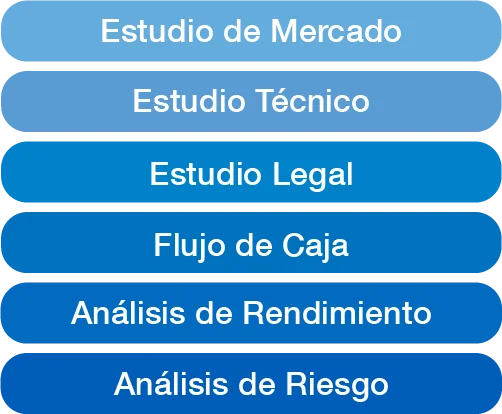Project evaluation study
Project Evaluation Study
index

When you consider investing in a business and doubts arise about its viability, our diagnosis is the best option. Through an exhaustive market, financial and technological analysis, we identify the viability of the project, the necessary deadlines and the costs involved for its successful implementation.
What is the evaluation of investment projects?
The evaluation of investment projects is an essential process to determine the viability and profitability of a business initiative. It involves a thorough analysis of various aspects, including costs, expected benefits, risks and payback period. Through financial techniques, such as the calculation of the net present value (NPV) and the internal rate of return (IRR), we seek to estimate the profitability of the project. In addition, economic, social and environmental factors are considered to evaluate their long-term impact and sustainability. This evaluation provides a solid basis for strategic decision making and efficient resource allocation, helping to maximize return on investment and minimize associated risks.
Why is it important to carry out feasibility studies?
It is crucial to conduct feasibility studies to determine the viability of a business project. These studies evaluate the accessibility of the resources necessary to achieve the established objectives. Viability is based on three basic factors:
- Operating Factor: Evaluates the ability to carry out the operations necessary for the project efficiently and effectively. This involves analyzing the availability of qualified labor, adequate infrastructure, and efficient operational processes.
- Technical Factor: Examines feasibility from a technical point of view, ensuring that the technology, equipment and knowledge necessary to carry out the project are available. The technical capacity to carry out the required tasks and the availability of adequate technical resources are considered.
- Economic factor: Analyzes the financial viability of the project, evaluating whether the income generated will be sufficient to cover costs and generate profits. Investment costs, recurring operating costs, expected revenues, and the payback period are calculated. In addition, the financial risk and the profitability expected by investors are considered.
The success of the project depends on the degree of feasibility in each of these three factors. Feasibility studies provide a comprehensive assessment of these aspects, allowing decision makers to determine whether the project is viable and offering clear guidance on the associated risks and opportunities. This helps ensure efficient resource allocation and maximize long-term project success.
What are project evaluation studies used for?
Project evaluation studies serve several important purposes:
- Identify advantages and challenges: They allow you to identify the possible advantages in terms of costs and benefits that the project can offer, as well as the problems and challenges it could face. This helps you make informed decisions and anticipate potential obstacles.
- Present detailed results: The results of these studies are presented in detail, providing exhaustive information on the key aspects of the project. This allows for a full understanding of its implications and helps stakeholders make decisions with confidence.
- Rely on specific methods: Project evaluation studies are based on specific methods and techniques designed to analyze and evaluate different aspects of projects and investments. This ensures that the analysis is rigorous and objective.

Stages of project evaluation
The stages of investment project evaluation include several fundamental steps:
- Project checklist: A thorough review of all aspects related to project planning is carried out, ensuring that all key elements have been considered.
- Review of the economic framework of the project: The financial statements and allocated budget are examined to understand the economic viability of the project and its ability to generate returns.
- Market study: Projected demand is analyzed and the long-term viability of the project in the target market is evaluated, taking into account factors such as competition and market trends.
- Project engineering analysis: Possible investments from partners and bank loans are considered to finance the project, evaluating its financial structure and technical feasibility.
- Analysis of the income and expense budget: A thorough analysis is performed of the expected revenue and costs associated with the project, ensuring that the budget is realistic and feasible.
- Comprehensive economic evaluation: A global evaluation is carried out to determine the feasibility and profitability of the project, using techniques such as the calculation of the net present value (NPV) and the internal rate of return (IRR) to evaluate its financial attractiveness.
By following these stages and steps, a complete understanding of the feasibility and profitability of the project is obtained, helping decision makers make informed decisions and maximize the long-term success of the project.
At ANEPSA Global we have expert appraisal experts on the subject, ready to provide you with the best advice. Contact us today to begin your project evaluation with confidence!
ANEPSA GLOBAL
With Anepsa Global it is possible for this and other types of appraisals to be carried out, contact us by leaving your information or sending a message through our social networks, we are here to provide you with advice and guide you so that you know what type of appraisal is best for you.



